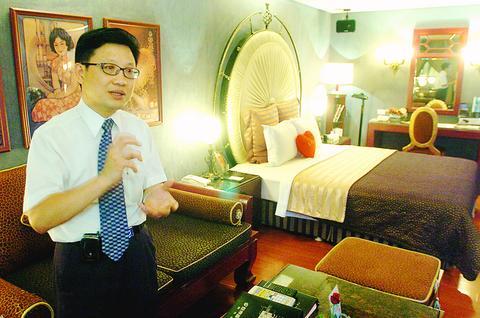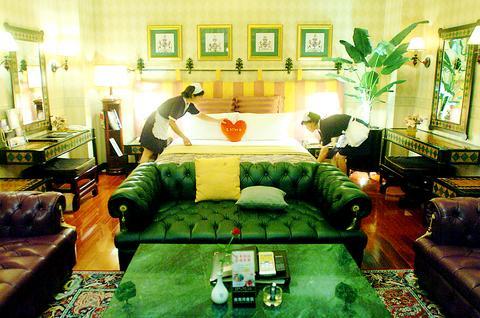In the West, motels and motor inns are functional, cheap places located by the side of roads.
In populous Taiwan, motor hotels have more to offer -- they are also a convenient and safe place for privacy-conscious people who want a couple of hours of intimacy, although that side of the industry creates a negative image for some people.

PHOTO: SEAN CHAO, TAIPEI TIMES
No more.

PHOTO: SEAN CHAO, TAIPEI TIMES
Some motels have been designed with flamboyant and luxurious decors and their owners hope to subvert the established idea of what a motel should look like.
The leading player in this effort to shake up the industry is WeGo Motel (
Long lines of luxury sedans with black-tinted windows waiting to enter the motel have become a common sight on Valentine's Day and other special holidays.
"We want to make it an interesting place, rather than just a plain room that customers rent to stay overnight," said Timothy Hsu (
WeGo Taipei broke with tradition by constructing an 87-room facility on a 3,000 ping (9,900m2) plot of land when it could have built 600 rooms.
The motel's 87 rooms were then decorated based on six themes -- tropical recreation, luxury fashion, oriental style, modernism, theme style and visual arts, Hsu said.
A total of 32 different styles have been created -- which means customers would have to stay 32 times to see each one.
Hsu said that with a total investment of NT$430 million (US$12.7 million), WeGo Taipei places a great deal of attention on the entertainment features in each room, with karaoke and a DVD player, a second TV by the jacuzzi and 40 different stage lamps installed to create a special atmosphere.
"We even provide different kinds of condoms and lubricants by the bed," said the 45-year-old Hsu, who began his career in real estate some 20 years ago in Taoyuan.
"The spirit of the service sector is to help resolve problems for customers," Hsu said.
The customer-oriented strategy might sound like a cliche, but apparently Hsu and his management team have a deep understanding of how to meet clients' demands and even try to anticipate their customers' wants.
The motel's marketing strategy and merchandise planning have already born fruit, as its annual revenues topped NT$100 million and the original plan of breaking even within five years will be reached ahead of schedule, Hsu said.
Hsu proudly noted that due to the motel's product positioning -- "designed for couples in love" -- WeGo is rarely affected by outside forces and maintained a high occupancy rate even during the SARS crisis last year.
According to the Tourism Bureau, the occupancy rate for the nation's 86 international and local tourist hotels was 67.66 percent in August. Last year the rate nosedived to 22 percent in May -- due to the SARS epidemic -- before bouncing to 68.02 percent in August.
Hsu said WeGo's customer base is people aged between 25 and 40. He said the motel places a high priority on "sumptuousness and fashion," which helps differentiate it from its competitors and secure customer loyalty.
"Service operators have a big misunderstanding. They think the 40-to-50 year-old age group, with its a solid economic foundation, usually spends the most," Hsu said.
"But they are wrong. Middle-aged people are generally more reluctant to spoil themselves because they were brought up amid poverty."
"So we make everything here new, fascinating, and full of fun to entice young people -- the heavy credit-card users who dare spend money enjoying life," he said.
One of the achievements Hsu is most proud of is changing the stereotyped image of motels as seedy places for affairs.
"With our decor and quality service, we see couples coming to celebrate their anniversary or birthdays," he said, "People no longer have to creep in."
Still, given WeGo Taipei's location in the city's old "Combat Zone" area, with its plethora of nightclubs and bars, it also relies on men who finish drinking at 2am or 3am and arrive with a bar girl on their arm.
WeGo's success has attracted imitators. Several luxurious, villa-style motels are popping up fast in Taichung's new phase-7 zoning area (
O'Well Motel (
While the cost of an 12-hour overnight stay averages NT$3,500 no matter where you go, these Tai-chung players charge only one-third of what WeGo costs for a three-hour period.
Hsu estimated that there are around 500 motels nationwide and about 100 firms are applying for licenses to build new ones.
"I think the market will soon reach saturation point and even go downhill in two years when supply surpasses demand," he said.
Liu Jui-tsung (
He said that stiffer competition will eliminate old-styled motels and allow better performers to survive, just like mom-and-pop stores started to disappear after 24-hour convenience stores were introduced to this country.
"They have to change their furnishings and offer new services to tap into the growing recreation industry now that more people have two days off per week," Liu said.
He said traditional tourist or business hotels don't have much to fear from the new motels, because their client bases rarely overlap.
However, small hotels or motels will see their revenues erode as those wanting a two- or three-hour break will turn to luxurious motels, Liu said.
Meanwhile, Hsu has set his eyes on the third project in Taipei City's Dazhi district.
To meet to the city government's development regulations for that area, Hsu plans to invest NT$1.4 billion in building a hotel complex, with half the space set aside for seven big ballrooms for banquets and weddings. The project is slated to be completed by the end of next year, he said.
"We'll have churches inside because many young people dream of walking down the aisle even though they're not Christians. Weddings will become so much fun and more meaningful, not just having dinner with relatives," Hsu said, waving his arms as he described the scene.
From motels to ballrooms -- Hsu likes combining interesting elements to create something new.
"I just want to be different," he said.

Meta Platforms Inc offered US$100 million bonuses to OpenAI employees in an unsuccessful bid to poach the ChatGPT maker’s talent and strengthen its own generative artificial intelligence (AI) teams, OpenAI CEO Sam Altman has said. Facebook’s parent company — a competitor of OpenAI — also offered “giant” annual salaries exceeding US$100 million to OpenAI staffers, Altman said in an interview on the Uncapped with Jack Altman podcast released on Tuesday. “It is crazy,” Sam Altman told his brother Jack in the interview. “I’m really happy that at least so far none of our best people have decided to take them

BYPASSING CHINA TARIFFS: In the first five months of this year, Foxconn sent US$4.4bn of iPhones to the US from India, compared with US$3.7bn in the whole of last year Nearly all the iPhones exported by Foxconn Technology Group (富士康科技集團) from India went to the US between March and last month, customs data showed, far above last year’s average of 50 percent and a clear sign of Apple Inc’s efforts to bypass high US tariffs imposed on China. The numbers, being reported by Reuters for the first time, show that Apple has realigned its India exports to almost exclusively serve the US market, when previously the devices were more widely distributed to nations including the Netherlands and the Czech Republic. During March to last month, Foxconn, known as Hon Hai Precision Industry

PLANS: MSI is also planning to upgrade its service center in the Netherlands Micro-Star International Co (MSI, 微星) yesterday said it plans to set up a server assembly line at its Poland service center this year at the earliest. The computer and peripherals manufacturer expects that the new server assembly line would shorten transportation times in shipments to European countries, a company spokesperson told the Taipei Times by telephone. MSI manufactures motherboards, graphics cards, notebook computers, servers, optical storage devices and communication devices. The company operates plants in Taiwan and China, and runs a global network of service centers. The company is also considering upgrading its service center in the Netherlands into a

Taiwan’s property market is entering a freeze, with mortgage activity across the nation’s six largest cities plummeting in the first quarter, H&B Realty Co (住商不動產) said yesterday, citing mounting pressure on housing demand amid tighter lending rules and regulatory curbs. Mortgage applications in Taipei, New Taipei City, Taoyuan, Taichung, Tainan and Kaohsiung totaled 28,078 from January to March, a sharp 36.3 percent decline from 44,082 in the same period last year, the nation’s largest real-estate brokerage by franchise said, citing data from the Joint Credit Information Center (JCIC, 聯徵中心). “The simultaneous decline across all six cities reflects just how drastically the market